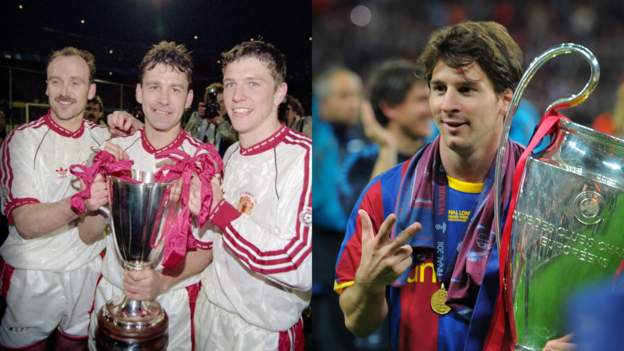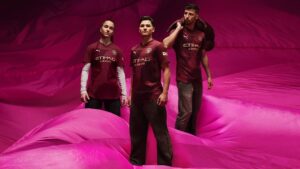They are two of the most successful and famous clubs in world football.
Yes, the Europa League play-off round has thrown up a terrific tie by pairing Manchester United with Barcelona over two legs on 16 and 23 February.
It will be their first Europa League meeting, a sign perhaps that both have fallen on leaner times recently.
They have faced-off in three European finals, one semi-final and two quarter-finals over the past 40 years, producing some unforgettable moments on the way.
United had the edge in the early meetings, winning two of the first three, but Barca have dominated the head-to-head this century, winning the past four encounters on the spin.
BBC Sport takes a look back at the pick of those matches.
It took until 1984 for the two giants of the European game to meet competitively – and it was a blockbuster.
Diego Maradona’s Barcelona looked set to cruise into the semi-finals of the European Cup Winners’ Cup – the long-defunct competition for domestic cup holders – when they beat United 2-0 in the first leg at the Nou Camp.
But they had not reckoned on the Red Devils’ Captain Marvel, Bryan Robson. The United legend outshone his Barca counterpart by scoring twice to level the tie on aggregate.
And with Maradona not appearing fully fit, Frank Stapleton scored the winner to send Ron Atkinson’s side through in what is still regarded as one of the great atmospheric European nights at Old Trafford.
The 1991 European Cup Winners’ Cup final was significant for a host of reasons – off the pitch and on it. It was the first season English clubs were allowed back into European competition following the blanket ban imposed after the 1985 Heysel disaster.
United manager Sir Alex Ferguson was constructing the foundations of an almost unparalleled era of domestic dominance in the decade ahead.
Ferguson’s team won 2-1 in the final in Rotterdam, beating a Barcelona side containing Ronald Koeman and Michael Laudrup. Mark Hughes banished memories of his tough time at the Nou Camp by scoring twice against his old side, with Robson setting up both.
It’s a finish we see increasingly in the modern game – a low cross slightly behind a forward, who improvises with a backheel flick between his own legs.
Back in 1994, it was pretty much unheard of, which is why United fans old enough to recall Lee Sharpe’s cheeky Champions League group-stage effort against Barcelona remember it vividly to this day.
Sharpe’s exquisite, instinctive 80th-minute finish from Roy Keane’s cross earned United a point in a 2-2 draw at Old Trafford after Barca had recovered from Hughes’ opener to lead through goals either side of half-time from Romario and Jose Mari Bakero.
But Barcelona would have the last laugh at the Nou Camp two weeks later with a 4-0 thrashing of United – without the suspended Eric Cantona and playing Gary Walsh in goal in place of Peter Schmeichel because of the “three-foreigner rule”external-link that existed in European competitions at that time. The Catalans pipped United to second in the group behind surprise winners IFK Gothenburg.
The 1998-99 season will be forever remembered for the two stoppage-time goals against Bayern Munich in the Champions League final – in, coincidentally, Barcelona – that completed Manchester United’s magical Treble-winning campaign.
In one of the toughest groups ever, the three sides – Barcelona, United and Bayern – had been drawn together, alongside Danish side Brondby. United and Barca kicked the group off in mid-September on an electric evening at Old Trafford.
Ryan Giggs and Paul Scholes fired Alex Ferguson’s side into a 2-0 lead and David Beckham scored a trademark free-kick later on but two Barcelona penalties – one for a Nicky Butt handball, for which he was red-carded – rescued a 3-3 draw in a game that marked the first Champions League appearance of a player who would go on to become a Barca legend, Xavi.
Almost unbelievably, the teams again shared six goals in the return fixture two months later, with United falling behind in the first minute to Sonny Anderson, only for Dwight Yorke’s double and an Andy Cole goal to put them 2-1 and 3-2 up. Rivaldo scored twice to earn Barca a point that was not enough to prevent their elimination, with two defeats by Bayern ultimately costing them.
Fast forward almost a decade from those meetings and the next instalment in the rivalry – a two-legged Champions League semi-final in 2008 – yielded just one goal across more than three hours of football.
But Manchester United would have cared little, because they got the goal through Paul Scholes to reach a Moscow final against Chelsea that they won on penalties.
After a goalless first leg in Spain in which Cristiano Ronaldo missed a penalty, United led inside a quarter of an hour in the Old Trafford return, Scholes arrowing home the type of 25-yard rocket that had become his calling card.
But the victory owed as much to United’s defensive doggedness as anything, as a back-line superbly marshalled by Rio Ferdinand shut out a Barca side featuring Lionel Messi, Samuel Eto’o, Deco, Yaya Toure, Andres Iniesta, Xavi and Thierry Henry in both legs.
Barcelona would not have to wait long, however, to exact their revenge as they beat United in both the 2009 and 2011 finals.
United, defending champions, began the 2009 final in Rome brightly, but Eto’o struck on 10 minutes to halt that and Messi netted the killer second goal 20 minutes from time. Barca emulated United’s achievement of a decade earlier in claiming the treble – La Liga, Copa del Rey and Champions League – becoming the first Spanish club in history to do so.
Barca were arguably even more dominant when the two sides met in the showpiece at Wembley two years later as Messi produced a masterclass, scoring one goal and setting up another for David Villa. United lost 3-1, with Wayne Rooney’s goal – cancelling out Pedro’s opener – their only shot on target as Barcelona mustered 12.
Almost eight years had passed by the time the two teams met again – with the eras of Ferguson and Guardiola long over and both clubs having suffered declines of differing degrees in the meantime.
But when Ole Gunnar Solskjaer replaced Jose Mourinho as manager at Old Trafford in late 2018, things began to look up – he won 10 of his first 11 games and even after his first defeat, by Paris St-Germain in the Champions League last 16, United turned that tie around with an unforgettable 3-1 win in France.
However, the task of facing Barcelona a round later would prove too much. A Luke Shaw own goal in Manchester gave the Catalans a narrow advantage; in the second leg, Marcus Rashford hit the bar after 40 seconds and Messi capitalised on the let-off by scoring twice, aided by a David de Gea blunder, as Barca won 3-0 on the night and 4-0 on aggregate.
Barca would go on to throw away a 3-0 aggregate lead against Liverpool in the semis.




